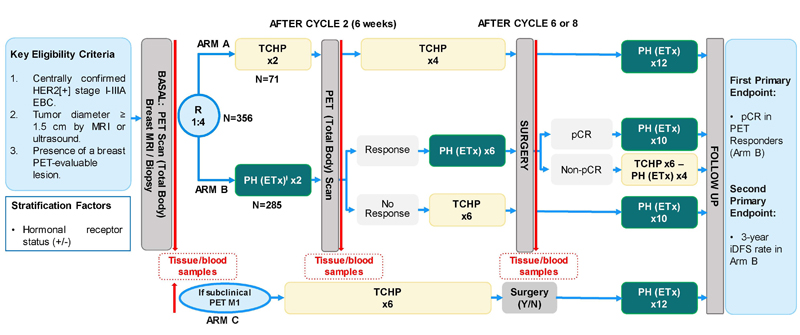In the GEOMETRY trial, 84 patients with high-level MET amplification (ALK and EGFR wildtype, stage IIIB/IV) received capmatinib 400 mg twice daily (n=15 were treatment-naïve, n=69 were second or third line). The primary endpoint of the trial was the objective response rate (ORR), while secondary endpoints were duration of response (DOR), progression-free survival (PFS), and overall survival (OS).
“The ORR in the treatment-naïve patients was 40%, and 29% in the pre-treated patients”, reported Prof. Jürgen Wolf (University Hospital Cologne, Germany) [1]. “In the majority of patients these were partial responses.” In addition, 40.6% of the pre-treated patients and 26.7% of the treatment-naïve patients showed stable disease, which results in a disease control rate of 71% and 66.7%, respectively. “The response rates observed in patients with high-level MET amplification are more moderate compared with MET exon14 skipping mutation cohorts”, said Prof. Wolf.
Median DOR was 8.31 months and 7.54 months and median PFS was 4.07 and 4.17 months in pre-treated and treatment-naïve patients, respectively. Median OS was 10.61 and 9.56 months in pre-treated and treatment-naïve patients, respectively. Capmatinib was well tolerated with a favourable safety profile, consistent with previous reports. “The most frequently observed toxicity was peripheral edema, nausea, vomiting, decreased appetite, and diarrhea”, reported Prof. Wolf.
“In conclusion, these results show that capmatinib demonstrates clinical activity in patients with high-level MET-amplified NSCLC. As is the case in patients with MET exon 14-skipping mutation NSCLC, response rates seem somewhat higher in treatment-naïve patients compared with pre-treated patients.”
- Wolf J, et al. ASCO Virtual Meeting, 29-31 May 2020, Abstract 9509.
Posted on
Previous Article
« Real-world evidence for MitraClip Next Article
TAVR versus surgery in older patients »
« Real-world evidence for MitraClip Next Article
TAVR versus surgery in older patients »
Table of Contents: ASCO 2020
Featured articles
COVID-19 & Telemedicine
COVID-19 and Cancer Consortium Registry: initial results
Oncology hospital-at-home model reduces hospitalizations, emergency department visits, and costs
Nurse-led telephone triage system reduces hospitalizations, helps patients manage symptoms at home
Melanoma
Adjuvant pembrolizumab: durable RFS for stage III melanoma
Adjuvant pembrolizumab: durable RFS for stage III melanoma
Pembrolizumab plus low-dose ipilimumab well tolerated after progression on PD1 antibody therapy
Toripalimab plus axitinib effective in metastatic mucosal melanoma
Breast & Ovarian Cancer
Advanced breast cancer: locoregional therapy does not improve OS
T-DM1 does not improve safety or efficacy in HER-2 positive early breast cancer; favorable iDFS reported
Maintenance olaparib improves OS in relapsed ovarian cancer with BRCA1/2 mutation
Combination pembrolizumab/chemo improves PFS in metastatic TNBC
Effect of veliparib with or without cisplatin in breast cancer: results of SWOG S1416
PHOEBE, a phase 3 trial comparing pyrotinib and lapatinib in HER2-positive metastatic breast cancer
BYLieve demonstrates efficacy of PIK3CA-directed treatment post CDK4/6-ihibition
Strategies emerge for chemotherapy de-escalation in HER2-positive breast cancer
Multiple Myeloma
Carfilzomib: no PFS benefit for multiple myeloma
Lung Cancer
ES-SCLC: tremelimumab + durvalumab + chemotherapy misses endpoint
Adjuvant osimertinib in NSCLC: practice changing ADAURA trial
ES-SCLC: pembrolizumab KEYNOTE-604 data
Second-line gemcitabine plus ramucirumab significantly improves overall survival
Tiragolumab and atezolizumab: ORR in NSCLC
MET-amplified advanced NSCLC responds well to MET inhibitor capmatinib
Genitourinary Cancer
Urothelial cancer: avelumab works as maintenance therapy
ARAMIS final OS and nmCRPC safety outcomes
Final survival results from phase 3 SPARTAN trial
Novel drug for kidney cancers/VHL patients
Primary analysis from IMvigor010, adjuvant atezolizumab in high risk muscle-invasive urothelial carcinoma
First randomised trial of Lu-PSMA in mCRPC progressing after docetaxel
Gastrointestinal Cancer
HER2-expressing metastatic colorectal cancer: trastuzumab deruxtecan
REGOMUNE: a phase 2 study combining regorafenib and avelumab
Cardiotoxicity: consider switching to S-1
Perioperative chemotherapy for resectable pancreatic ductal adenocarcinoma
Real-world data of sequential sorafenib followed by regorafenib in unresectable HCC
Paediatric Cancer
Sustained improvements in quality of life with larotrectinib
Promising first immunotherapy trial in placental trophoblastic tumours
Precision medicine for poor-prognosis paediatric patients
Related Articles

September 2, 2020
ASCO 2020 Highlights Podcast

September 17, 2020
First randomised trial of Lu-PSMA in mCRPC progressing after docetaxel
© 2024 Medicom Medical Publishers. All rights reserved. Terms and Conditions | Privacy Policy
HEAD OFFICE
Laarderhoogtweg 25
1101 EB Amsterdam
The Netherlands
T: +31 85 4012 560
E: publishers@medicom-publishers.com

